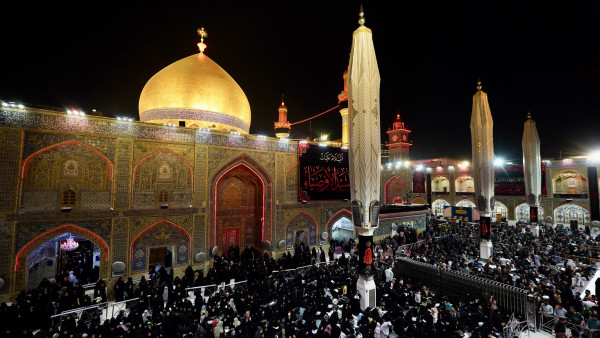On Sunday, a shadow account for Muqtada al-Sadr on the X platform issued a detailed rebuttal to the contentious video, threatening Al-Khabbaz and urging him to return to his birthplace in Qatif, Saudi Arabia. [Getty]
In a developing saga, Munir Al-Khabbaz, a Saudi Arabian Shia cleric residing in Iraq, faces mounting pressure to leave the country following the circulation of an old video on social media. The video, allegedly showing Khabbaz criticising the late father of prominent Shia cleric Muqtada al-Sadr, has sparked a heated response from Sadr loyalists.
On Sunday, a shadow account for Muqtada al-Sadr on the X platform, which is called the Leader’s Minister, issued a detailed rebuttal to the contentious video, threatening Al-Khabbaz and urging him to return to his birthplace in Al-Qatif, Saudi Arabia. The video features Al-Khabbaz discussing the Shia marjaeyat (jurisprudence), disputing the division into silent and speaking factions—a discourse interpreted by Sadr loyalists as an insult to the legacy of Mohammed Sadiq Al-Sadr.
Al-Khabbaz, born in Al-Qatif in 1964, is a respected Shia religious scholar who has traversed various countries, including Iraq, Syria, and Iran, to pursue religious studies.
As tensions escalate, political observers warn that Al-Khabbaz’s life may be in jeopardy and urge him to leave Iraq immediately. The cleric would be hanged if extradited to Saudi Arabia, the observers have claimed.
In an indirect response to Sadr, Abu Ali al-Askari, a senior official in the Kataib Hezbollah faction, stated on Monday on the X platform that Najaf, the capital of Imam Ali, is a place where diverse marjaeyas and scholars should be respected.
In a potentially related development, Saudi Ambassador to Baghdad Abdulaziz Al-Shammari made a highly publicised visit to a major Shia shrine in Karbala in May, signaling a shift in Saudi Arabia’s approach to Iraq. The ambassador, accompanied by Karbala Governor Nassif Al-Khattabi and other dignitaries, emphasised a mutual desire for “economic and political integration in all fields.”
This visit, featuring a tour of the shrine of Hussein ibn Ali, the third Shia Imam and grandson of Prophet Muhammad, marks a significant step in the evolving relationship between the two countries.
Some Iraqi social media users have alleged that Al-Khabbaz’s story resurfaced following Al-Shammari’s visit, suggesting an Iraqi-Saudi plan to eliminate the cleric.
Abdul Ghani Ghazban, an Iraqi political observer, noted that relations between Iraq and Saudi Arabia, though longstanding, had seen setbacks during the war against the Islamic State but have improved with recent diplomatic exchanges.
He emphasised that Saudi Crown Prince Mohammed bin Salman Al Saud is keen to strengthen ties with Iraq, focusing on nationalism and religious unity rather than sectarianism. Ghazban highlighted the importance of Saudi investment in Iraq, particularly in the Road to Development initiative, following the example of other Gulf countries like Qatar and the UAE.


